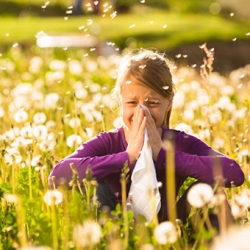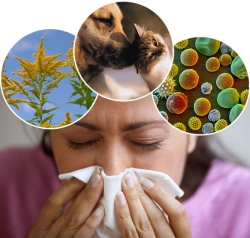
If you’re one of the 75 million Americans who suffer from allergies, you know all too well how your symptoms can make you feel trapped. We connected with Dr. Vivian Hernandez-Trujillo, Pediatric Allergist and Immunologist and Claritin C.L.E.A.R. Council member, to find out more about seasonal allergies, common symptoms and what you can do to help keep them at bay this spring.
Let’s start with the basics, what can you tell us about seasonal allergies?
An “allergy” is a sensitivity of the immune system to something that is generally harmless. When the body tries to rid itself of the “allergen” (foreign substance), it causes symptoms such as sneezing, watery, itchy eyes, or a runny nose. Common allergens include pet dander, pollen, dust mites, and mold. This sensitivity often starts during childhood or adolescence. And although it is not fully understood why some people develop allergies and others don’t, we do know that allergies can be inherited. If both parents have allergies, the likelihood of a child developing allergies is 65 percent. If just the mother or father has allergies, the likelihood of a child developing allergies is approximately 50 percent.
What are some common symptoms of seasonal allergies?
While everyone’s allergy symptoms may be slightly different, some of the most common symptoms are a runny nose, sneezing and irritated, itchy, or watery eyes. Spring is often the worst time of year for my patients with seasonal allergies, but the reality is people can experience allergies during any season. The summer and fall can also bring about allergy symptoms among some sufferers. The timing and duration of each allergy sufferer’s symptoms truly varies.
What are some ways people can manage their or their children’s seasonal allergies this spring?

The good news is allergies don’t have to hold anyone back from spending time outdoors this Spring. Heading into allergy season, there are a few tips I always give my patients to stay ahead of their symptoms:
Be ready. Keep an allergy medicine, such as Claritin®, on hand. Claritin offers products to help the entire family, including Children’s Claritin. Children’s Claritin provides relief of your child’s allergy symptoms for 24-hours without causing drowsiness. The key is to give it to your child as soon as his or her symptoms start.
Check the pollen forecast: The highest pollen production sometimes occurs in the early morning, so try to plan outdoor activities accordingly.
Wash appropriately: Bathe and wash your or your child’s hair immediately after going back indoors to get rid of any pollen that may have collected on you while outside.
Know your enemy: Recognize what causes both your allergy symptoms and your children’s allergy symptoms. If grass pollen is one of your triggers, wear a mask when you mow the lawn or avoid doing it.
Where can people go for more information?
You can visit www.claritinespanol.com for more information about seasonal allergies, symptom management and treatment with Claritin. While you’re there, you can also get a coupon to help relieve your seasonal allergy symptoms.











